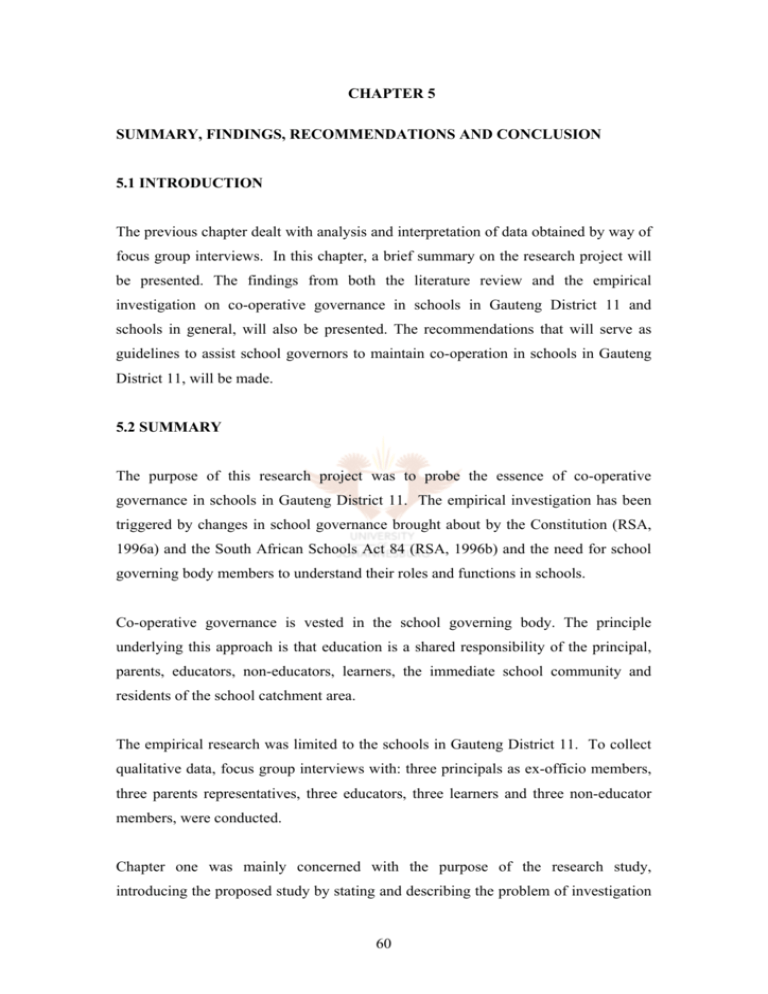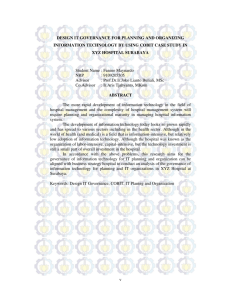Co-operative Governance in Schools: Research Summary & Findings
advertisement

CHAPTER 5 SUMMARY, FINDINGS, RECOMMENDATIONS AND CONCLUSION 5.1 INTRODUCTION The previous chapter dealt with analysis and interpretation of data obtained by way of focus group interviews. In this chapter, a brief summary on the research project will be presented. The findings from both the literature review and the empirical investigation on co-operative governance in schools in Gauteng District 11 and schools in general, will also be presented. The recommendations that will serve as guidelines to assist school governors to maintain co-operation in schools in Gauteng District 11, will be made. 5.2 SUMMARY The purpose of this research project was to probe the essence of co-operative governance in schools in Gauteng District 11. The empirical investigation has been triggered by changes in school governance brought about by the Constitution (RSA, 1996a) and the South African Schools Act 84 (RSA, 1996b) and the need for school governing body members to understand their roles and functions in schools. Co-operative governance is vested in the school governing body. The principle underlying this approach is that education is a shared responsibility of the principal, parents, educators, non-educators, learners, the immediate school community and residents of the school catchment area. The empirical research was limited to the schools in Gauteng District 11. To collect qualitative data, focus group interviews with: three principals as ex-officio members, three parents representatives, three educators, three learners and three non-educator members, were conducted. Chapter one was mainly concerned with the purpose of the research study, introducing the proposed study by stating and describing the problem of investigation 60 and clarifying some concepts as they are applicable to the study. The research design and methods were explained. Chapter two focused on literature review on co-operative governance in schools. In this chapter it was discovered that co-operative governance is important to establish and maintain partnerships and teamwork between the school governors and other stakeholders. Chapter three described the methodology and design of the research project. It further described the population and sample that were employed to collect the empirical data. The focus group interviews were used to collect data. The mode of selecting interviewees was purposive. Chapter four was dedicated to the data analysis using the constant comparative method and interpretation of results that subsequently led to the findings and recommendations. Having discussed the foregoing, the next section will focus on the important findings from the research study. 5.3 FINDINGS In light of the literature review and responses from the focus group interviews, research findings will be presented in two categories namely, findings from the literature and those from the focus group interviews. 5.3.1 Findings from the literature review The following are findings obtained from the literature review: 5.3.1.1 Co-operative governance In this research, it was found from the literature that co-operative governance in schools is characterised by: 61 • Mutual trust and respect • Shared vision • Shared decision – making • Shared goals and values • Open communication and • Good teamwork and respect for the roles of different partners (See paragraph 2.2). It has been indicated that co-operative governance is essential fro the achievement of school goals and objectives. 5.3.1.2 Teamwork The most striking quality of co-operative governance, according to literature consulted, is teamwork. Teamwork represents a set of values that encourages listening and responding constructively to views expressed by others, providing support and recognising their achievements for the benefit of the team (See paragraph 2.4.1). Furthermore, it has been found out that teamwork at school involves the ability of working together between parents, educators, learners and other stakeholders in order to achieve the common goal of the school. The essence of a team is common commitment and also that this kind of commitment requires purpose in which team members can believe. 5.3.1.3 Communication Among other things this research study revealed that in schools where co-operative governance is practiced, channels of communications between the different systems would be as open as possible to facilitate maximum participation in the life of the school. For example, decisions taken at stakeholder meetings would be recorded and distributed to all other relevant structures in the school. All relevant role players would therefore be kept up to date with the discussions and decisions agreed upon (See paragraph 2.4.2). 62 5.3.1.4 Partnership It has been found that good healthy relationships at school will enhance partnerships and thereby promote co-operative governance. It has also been found that the more school governors are exposed to the principle of partnership, the more they adopt team approaches in different activities at school. Partners share information, skills, decision making, responsibility and accountability through working together or taking complementary roles (See paragraph 2.4.6). 5.3.1.5 Collaboration This investigation revealed that collaborative governance and leadership are based on: • Vision and mission statements • Positive interpersonal working relationships • Mutual support • Mutual understanding and • Shared purpose (See paragraph 2.4.4) The findings from literature review characterises the ideal co-operative school governance. In order to determine the perceptions of various stakeholders on how this system of co-operative school governance is working in reality, an empirical investigation was undertaken. The empirical findings will now be highlighted. 5.3.2 Findings from the empirical investigation An analysis of qualitative data collected through focus group interviews revealed the following findings: 5.3.2.1 Inadequate parental involvement Parental involvement remains a problem in most of schools in Gauteng District 11. Some parents are involved in some activities, but the involvement is characterised by 63 apathy and lack of commitment. The findings also indicate that the extent of parents participation in school governance is defined by literacy and socio-economic level. 5.3.2.2 Organisation Structure Another empirical finding is that some schools are autocratically structured. These schools perpetuate a top down hierarchical leadership and management approach. Some stakeholders are excluded in decision-making. No proper consultation and some decisions are dictated to members. It was also found that in many cases principals still remain central to school governance. 5.3.2.3 Capacity building It has been found out that in most of the schools in Gauteng District 11, there is high level of illiteracy, lack of governing competency and insufficient in-service training, especially amongst the parent members in the governing bodies. All this relate to lack of capacity among the parent and learner representatives in the SGB. Some respondents indicated that there is a need for the capacity building of the SGB members in various aspects of school life. They felt that this would enhance their meaningful participation in co-operative governance. From the findings, it seems as if the ultimate success of the school governing bodies in many schools will depend on the type and extent of the training the department has undertaken to provide. 5.3.2.4 Discipline Another important finding is that the management of discipline and order remain a problem in most schools in Gauteng District 11. The respondents indicated that there is a need for SGB members to have a clear understanding of disciplinary measure to take place at their schools. It was also found that as a result of ill discipline in schools, stakeholders end up pointing finger at each others instead of working together in trying to get the problems addressed. Most SGB members do not work together in the aspect of discipline at school. 64 5.3.2.5 Policies Findings indicate that the availability of policy documents and the extent to which stakeholders are familiar with the content thereof impacts on the activities of the governing bodies. Members appear to be more resistant to being governed by policies that they have little or no part in formulating. They appear to be disgruntled about following or implementing policies that are imposed on them. The outcomes showed that all stakeholders could be more co-operative if they are involved when policies are drawn. It appears that there are differences between the ideal world as represented by the literature and the real world as represented by the empirical findings. A large gap exists between that which is presented as the ideal through the South African Schools Act (RSA, 1996b) and literature and that, which is happening in the everyday reality in the schools. Hopefully the recommendations of this research will manage to remove the gap and assist in providing guidelines to sychromise the ideal with reality. 5.4 RECOMMENDATIONS The following recommendations were made to assist in maintaining co-operative governance in schools: Recommendation 1 It is recommended that the SGB’s should communicate more effectively with parents as this forms the basis for parental involvement and commitment in school governance. Schools may communicate with parents through the use of a newsletter, brochure, telephone, e-mail etc. Members of the SGB’s together with the school management team should devise some other strategies of communicating with parents, such as awareness campaign, conducting home visits to make parents aware of their rights, the use of media (radio and newspapers) and also distribution of brochure, so that even those who could not attend meetings could still get the information and also have understanding of the importance of parental involvement is school activities. 65 Recommendation 2 Analysis of the focus group interviews revealed that most SGB’s lack an in-depth knowledge and understanding of their roles and functions due to lack of capacity to perform such functions. This was mainly due to lack of effective training and high illiteracy level. It is therefore recommended that, in order for SGB’s to develop an in-depth understanding of their roles and functions, the Head of Department (Provincial) as stipulated in the South African Schools Act (RSA, 1996b) should provide effective capacity building programmes in the form of conferences, inductions, seminars, formal trainings and literacy programmes. The provincial Head of Department in collaboration with district managers should see to it that enough money is set aside for capacity building and also employ competent trainers who are equipped with relevant capacity building skills. It is further recommended that certificates should be awarded after each training session to encourage the SGB’s members to attend the capacity building programmes. Recommendation 3 From the literature survey it is evident that the school governing bodies should be competent in creating co-operative school governance. It is recommended that the SGBs should develop strategic governance to enhance cooperation in schools. The following should be taken into consideration when developing such strategies: • Shared vision and mission statement The school governing body must develop a clear vision for the school. The vision must be shared and owned by all stakeholders in the school. It should also develop a clear mission statement that, all members share and to which they are all committed. 66 • Shared decision-making All stakeholders should be given opportunity to participate in decision-making process, as this would give them a feeling of empowerment and enable them to claim ownership of the decisions, which increase their motivation and commitment to school activities. • Shared goals and values The school governing body needs to set up goals that are shared by all members in the school governing body. These goals will guide the efforts of the SGB in the execution of its functions in the school. Recommendation 4 From the literature review, it has been found that, teamwork forms the basis for cooperative governance. It is therefore recommended that, the SGB must establish various committees including sub-committees that are motivated to work as teams. The SGB must create a climate that make members work together with one another and share their knowledge, skills and expertise in order to achieve the common goal of the school. Recommendation 5 All stakeholders should create organisation structures in such a way that enables a high degree of participation. It is recommended that democratic organisation structure should be employed in schools as it enhances participative decision-making, shared vision, trust, mutual accountability and tolerance. Recommendation 6 The focus group interviews revealed that management of discipline and order remain a problem in most schools in Gauteng District 11. 67 It is therefore recommended that, the SGB’s should furnish parents, educators and learners with school code of conduct that reflects the vision and mission statement of the school. The educators should also be capacitated about the “SACE” code of conduct. The following legislation should also be distributed to all educators: • The Employment of Educators Act 76 of 1998 (RSA, 1998) • The South African School Act 84 of 1996 (RSA, 1996b) • The Constitution of South African Act 108 of 1996 (RSA, 1996a) and also the • Labour Relations Act 66 of 1995 (RSA, 1995). Recommendation 7 It is recommended that the school governing bodies should promote the process of cooperative governance through the culture of collaboration. The real change that should be effected by the governing bodies should be based on the understanding that decisions on school matters should be made by those who best understand the needs of learners and the local community. Recommendation 8 The school must draw clear policies that guide all stakeholders to eliminate practices that are clearly in contrast with the mission of the school. The school policies must be designed in such a way that they form a powerful tools that school can use to enhance co-operative governance. It is further recommended that all the SGB members must take part in policies formulation. Opportunity for the SGB member’s participation in formulating policies give them a feeling of empowerment and enable them to claim ownership of the policies, which increases their motivation and commitment to implement the policies more effectively. 68 Recommendation 9 It is recommended that the SGB design information programmes that provide all stakeholders with up to date and accurate data about the activities of the school. Open communication revolves around team spirit, mutual trust and respect, therefore there is a great need for the governing bodies to co-operate and have open communication channels in schools. Healthy communication will promote more co-operation in school governance. Recommendation 10 The literature review reflected that a good healthy relationship at school enhances partnership thereby promoting co-operative governance. It is therefore recommended that the SGB should identify skilled persons in the school community and encourage them to participate in the affairs of the school. For example, experienced retired educators, accountants, lawyers and other professionals can empower the SGB members in performing their duties. 5.5 FURTHER RESEARCH The following recommendations are suggested for further research: • It is recommended that further research on co-operative governance be conducted in other districts in the same province and other provinces in order to examine the nature of co-operative governance in schools to ensure that schools are transforming. • Further research has to be made on effective parental involvement in school governance in township and rural areas schools. • The importance of effective communication in school governance 69 5.6 CONCLUSION The objectives of this research study have been met as they have been outlined. The aims of this research have been identified and related to the need for co-operative governance in schools in Gauteng District 11. In this chapter a summary of the research project have been given. The findings as well as the recommendations for maintaining co-operative governance in schools were also presented. Co-operative governance is very important and contributes to high school performance. Key components in this pursuit of co-operative governance is of course teamwork and effective communication. It is essential that all the basic principles for teamwork and effective communication should be clearly understood by school governors. 70







